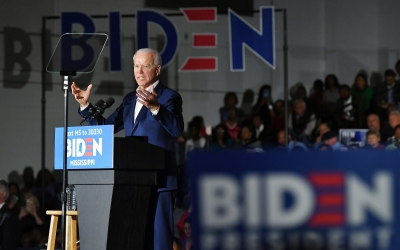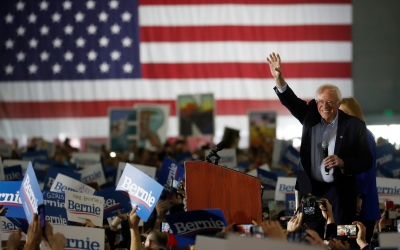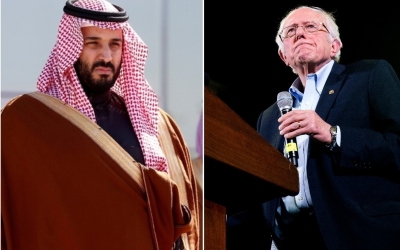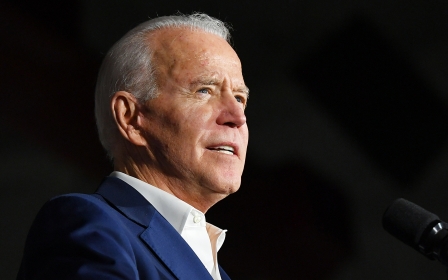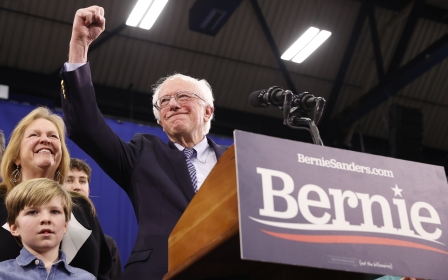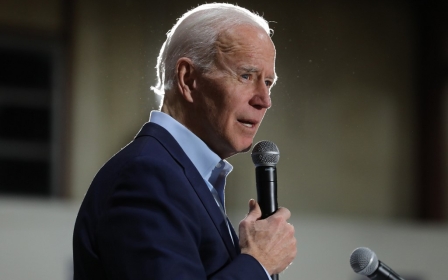Biden vs Sanders: How the Democratic rivals would reshape US Middle East policy
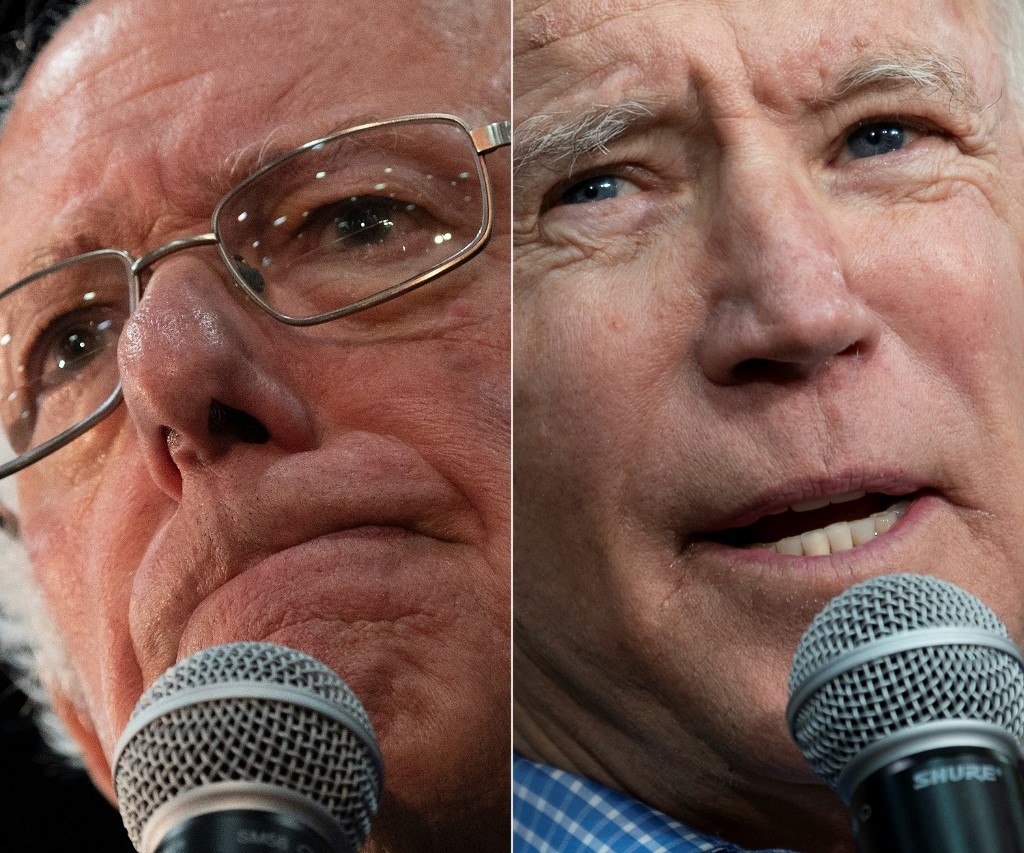
The race for the Democratic nomination has effectively whittled down to two, with Joe Biden or Bernie Sanders likely to face US President Donald Trump in November.
In their first one-on-one debate on Sunday, both candidates focused heavily on the threat posed by the deadly coronavirus pandemic and the Trump administration's handling of the crisis.
Despite recent attacks on US bases in Iraq, and the humanitarian crisis unfolding in Syria's Idlib region, US foreign policy positions with reference to the Middle East barely made a mention in CNN's two-hour debate.
With Biden currently leading the race for the Democratic nomination with 857 delegates to Sanders' 709, Middle East Eye takes a look back at where they've stood on some major issues in the region throughout their respective careers.
On tensions with Iran
New MEE newsletter: Jerusalem Dispatch
Sign up to get the latest insights and analysis on Israel-Palestine, alongside Turkey Unpacked and other MEE newsletters
Biden
The Trump administration's assassination of senior Iranian General Qassem Soleimani in January came after months of rising tensions between Washington and Tehran.
Last month, during a presidential debate in New Hampshire, Biden said he would not have ordered the strike had he been president at the time. He also accused the White House of not providing "any evidence" that the action was taken to prevent an imminent threat to Americans, something the administration repeatedly touted.
Biden has also been highly critical of Trump's decision to pull out of the multilateral nuclear deal with Iran, known as the Joint Comprehensive Plan of Action (JCPOA).
"The seeds of danger were planted by Trump himself on May the 8th, 2018," Biden said following the Soleimani strike, referring to the date Trump nixed the accord.
The deal was brokered by the Obama administration and is seen as the former president's signature foreign policy achievement.
As vice president, Biden also helped promote the accord during his tenure by convincing sceptical Democrats in Congress to back the measure.
"Look, I'm the guy that helped put together the Iran deal and got the inspectors in there. That was my chief of staff ... my foreign policy guy, doing that negotiation," Biden said during the most recent debate on Sunday.
Sanders
Sanders has vowed to return to the Iran nuclear deal on the first day of his presidency. The senator has consistently argued that the agreement prevented war with Iran and blocked its path towards a nuclear weapon.
Sanders has also been a leader in a movement pushing to roll back presidential war powers to ensure that congressional approval is sought by the White House before authorising strikes like the one against Soleimani earlier this year.
"Trump makes decisions impulsively, without explanation, and as in this case as in the past, without any congressional consultation," Sanders said in January.
"I believe that a key step in ending our endless wars is for Congress to reassert its constitutional authority over matters of war."
While Sanders' position on returning to the diplomatic table with Iran is the norm in the current Democratic field, he was only one of two senators to vote against a bill to impose new sanctions against Iran in 2017.
Sanders had cautioned that the bill came at a time when Trump was considering leaving the Iran nuclear deal - which he eventually did.
"I think new sanctions on Iran at this time take us in a dangerous direction," Sanders said in 2017.
On illegal Israeli settlements
Biden
Biden has been a vocal advocate for Israel throughout his time in the Senate, painting it as a vital ally to US interests in the region.
"Were there not an Israel, the United States of America would have to invent an Israel to protect our interests in the region," Biden said on the Senate floor in 1986.
Even now, he describes himself as a "stalwart supporter of Israel".
But as cracks started to show between the Obama administration and the Israeli government, Biden grew more critical of Israel over its policy of expanding settlements in the occupied West Bank.
Still, his criticism remained grounded and always paired with assigning blame on Palestinians.
In a brief video published by J Street in October of last year, he denounced Israel's settlement policy but also called on Palestinians to "stop violent attacks on Israel".
"Israelis wake up every morning facing an existential threat from their neighbours in the region, and they live each day with tremendous courage, but also anxiety," Biden said.
"That's why we always have to be adamant that Israel must be able to defend itself."
Biden delivered a video message to AIPAC's conference earlier this month, during which he emphasised the importance of US-Israeli relations and talked up his pro-Israel credentials. During the address, he also criticised Israel for settlement expansion.
In line with the Democratic status quo, he has stressed the two-state solution as the sole feasible resolution to the conflict.
In 2018, Biden dismissed a proposal by Sanders to impose conditions on US aid to Israel.
"The idea that I'd withdraw military aid - as others have suggested - from Israel, is bizarre," the former vice president said. "I would not do that."
Sanders
As Biden pointed out, Sanders supports the conditioning of US military aid to Israel as a pressure mechanism to stop the country from taking actions that go against US interests, such as the expansion of Israel's illegal settlements and the continuation of inhumane living conditions in Gaza.
"Ultimately, it’s up to the Palestinians and Israelis themselves to make the choices necessary for a final agreement, but the United States has a major role to play in brokering that agreement," he told the Council on Foreign Relations in 2019.
"My administration would also be willing to bring real pressure to bear on both sides, including conditioning military aid, to create consequences for moves that undermine the chances for peace," he said.
The Vermont senator, who is Jewish, is the first frontrunner in a presidential election to openly criticise Israel, rejecting the notion that being critical of its government makes one antisemitic.
"Israel has the right to not only exist, but to exist in peace and security," Sanders said on the debate stage in December.
"But what US foreign policy has to be about is not only being pro-Israel, we must be pro-Palestinian as well."
He, along with former candidate Elizabeth Warren, refused to attend the AIPAC conference earlier this month, accusing the pro-Israel organisation of providing a platform for "bigotry".
The senator advocates for a two-state solution to the conflict based on the 1967 lines, with Jerusalem as a shared capital for both Israel and Palestine.
On Saudi Arabia and the war in Yemen
Biden
Biden announced his first foreign policy stance as a 2020 presidential candidate back in May, calling for an end to US support for Saudi Arabia's war in Yemen.
Although the Saudi-led war in Yemen started with the full support of the Obama-Biden administration in 2015, Biden has pledged to end US assistance for the kingdom's "disastrous" conflict.
"President Trump has issued Saudi Arabia a dangerous blank check," Biden told the Council on Foreign Relations last August.
"Saudi Arabia has used it to extend a war in Yemen that has created the world’s worst humanitarian crisis, pursue reckless foreign policy fights, and repress its own people."
At a debate in November, he pledged to stop weapons sales to the kingdom, vowing to hold Riyadh accountable for the murder of Saudi dissident Jamal Khashoggi.
"I would make it very clear we were not going to, in fact, sell more weapons to them," Biden said. "We were going to, in fact, make them pay the price, and make them, in fact, the pariah that they are."
Sanders
Like Biden, Sanders has been a staunch critic of US support to Saudi Arabia over its actions in Yemen.
In fact, Sanders was the lead sponsor for a Senate resolution to end US support for the Saudi-led war and has been one of Riyadh's most vocal critics on Capitol Hill.
"I have led the effort against all forms of authoritarianism, including America's so-called allies in the UAE and in Saudi Arabia, and in fact, as you may know, I worked with conservative Republicans to utilise for the very first time the War Powers Act to get the United States out of the horrific war in Yemen, led by Saudi Arabia," Sanders said during the most recent debate on Sunday.
The anti-war resolution was eventually vetoed by the White House. But Sanders said he will end American support to the Saudi war effort if elected president.
Sanders has also extensively criticised Saudi Arabia's human rights record and called for reevaluating US-Saudi relations.
"The reality is that the US-Saudi relationship needs to change," he told the Council on Foreign Relations last year.
"It is based on cheap oil, millions of dollars of arms sales, a complete disregard for Saudi Arabia's human rights violations, and willful blindness when it comes to Saudi's spread of religious radicalism."
Sanders has also called for accountability for the murder of Jamal Khashoggi, denouncing the "despotic" Saudi government.
The slain journalist had said in an interview published following his murder that Sanders was the only US politician willing to push back against Saudi Arabia's powerful crown prince, Mohammed bin Salman (MBS).
"Do you see anybody in America except for Bernie Sanders who is calling for putting pressure on MBS? I only saw Bernie Sanders, but no one else," Khashoggi told Newsweek before he was killed by Saudi government agents on 2 October 2018.
On Egypt
Biden
Biden, a former Senate Foreign Relations Committee chairman, took some major heat for his stance on Egypt back in 2011, while serving as Obama's vice president.
Following massive anti-government protests that had erupted in Egypt, Biden - during a PBS interview - praised former President Hosni Mubarak, saying he should retain his grip on power.
He also refused to label the leader, who had been in power for 30 years, a dictator.
"Mubarak has been an ally of ours in a number of things and he's been very responsible on, relative to geopolitical interests in the region: Middle East peace efforts, the actions Egypt has taken relative to normalising the relationship with Israel. And I think that it would be - I would not refer to him as a dictator," Biden said at the time.
He has said little publicly on Egypt's current government, led by Abdel Fattah el-Sisi.
In January, Biden condemned the death of Moustafa Kassem, an American citizen, in an Egyptian prison, describing it as an "outrage".
Sanders
For his part, Sanders supported Egypt's 2011 protests and praised reports that Mubarak would be stepping down.
“After 30 years of autocratic rule, Hosni Mubarak is gone," Sander said in a press release at the time.
He called the news "extraordinary" and insisted the US "play an active role in helping the democratic forces in Egypt" transition.
Sanders has also voiced his support for more recent protests in Egypt, tweeting in September that Egyptian President Sisi should "respect" the right of Egyptians to protest and criticised US President Donald Trump for calling Sisi his "favourite dictator".
"I believe the United States should stand for human rights, especially with governments that receive large amounts of US aid, as Egypt does. All people have the right to protest for a better future. Sisi should respect that right," Sanders said.
On the war in Syria
Biden
Biden has supported the idea of US military intervention in Syria, but his position on regime change seems to have taken a turn.
At an AIPAC event in 2013, Biden suggested the US supported regime change in Syria.
"Our position on that tragedy could not be clearer: [Syrian President Bashar al-]Assad must go," he said at the time.
But during a presidential debate in October, Biden said regime change "has not been the policy", instead he said, "it has been to make sure that the regime did not wipe out hundreds of thousands of innocent people between there and the Iraqi border".
Back in 2016, around the end of the Obama administration, and after meeting with Turkish leaders, Biden suggested that the US would be willing to use military intervention in Syria if necessary.
"We do know that it would be better if we can reach a political solution, but we are prepared - we are prepared if that’s not possible to make - to have a military solution to this operation in taking out Daesh," Biden said, using the Arabic acronym for the Islamic State (IS) group.
At the time, Washington had already expanded US air strikes to cover Syria and had a limited number of troops there training local forces in the fight against IS.
In October, Biden slammed Trump’s withdrawal of US forces from Syria, calling it the latest proof that the president is a "complete failure", who is gutting American credibility around the world.
"It’s more insidious than the betrayal of our brave Kurdish partners; it’s more dangerous than taking the boot off the neck of ISIS,” he said, using a different acronym for IS.
Sanders
Sanders also bashed the Trump administration for its plan to withdraw US troops from Syria.
"You don’t turn your back on an ally that lost 11,000 troops fighting against terrorism through a tweet and a discussion with [Turkish President Recep Tayyip] Erdogan," Sanders said in an interview with ABC in October.
At the same time, he has been critical of US air strikes and Syrian President Assad, saying the leader "has got to go", but calling for a more multilateral diplomatic solution over military intervention.
The senator has pushed for congressional approval for any US action taken in Syria, consistently arguing that it is up to lawmakers to decide on American military intervention abroad, not the president.
On the war in Iraq
Biden
Biden, then chairman of the Senate Foreign Relations Committee, voted in favour of former President George W Bush's 2002 invasion of Iraq - an issue that has come up repeatedly in the 2020 race for the nomination.
"I do not believe this is a rush to war," Biden said a few days before the 2002 vote. "I believe it is a march to peace and security. I believe that failure to overwhelmingly support this resolution is likely to enhance the prospects that war will occur."
During the debate on Sunday, as well as the one in February, Biden reiterated that he made "a mistake" in voting for the authorisation.
"I trusted George Bush to keep his word. He said he was not going to go into Iraq. He said he was only using this to unite the United Nations to insist we get inspectors in," Biden said last month.
In 2006, Biden co-authored a plan to segregate Iraq into three self-governing regions between Arab Shias, Arab Sunnis, and the Kurds.
While the plan was massively unpopular in Washington at the time, Biden revisited the idea on the debate stage when running for president in 2007.
Biden's recent comments regarding Iraq have mostly focused on explaining his past decisions, saying little about what he would do with US foreign policy toward the country in today's climate or his views regarding recent popular protests.
During a debate in January, Biden defended the need to keep special forces in places such as Iraq, despite Iraqi demands for US forces to leave the country.
He and Senator Amy Klobuchar, a former opponent who has since endorsed Biden, were the only two candidates at that debate to explicitly say they would leave US troops in the Middle East.
Sanders
Sanders was a leading opponent of the US' 2002 invasion of Iraq, voting against the War Powers Act that gave Bush broad authorisation for military action.
Sanders has vowed to pull out "combat troops" from the region, but has not laid out his plan on how he would do that, or defined what he considers "combat troops".
He has argued that Americans are "sick and tired of endless wars, which have cost us trillions of dollars" and says that if elected, he plans on helping to rebuild the United Nations and the US State Department in order to focus more on diplomacy and less on military intervention.
The senator has expressed optimism regarding recent protests in Iraq, as well as in Lebanon, saying that the "spirit" of the Arab Spring was still "very much alive".
"The Arab Spring rose up to fight corruption, repression, inequality and austerity," he wrote in an October tweet.
"The Lebanon and Iraq protests show this spirit is still very much alive. If we want a progressive future, we need to build up a global movement of and for working people."
Middle East Eye delivers independent and unrivalled coverage and analysis of the Middle East, North Africa and beyond. To learn more about republishing this content and the associated fees, please fill out this form. More about MEE can be found here.


